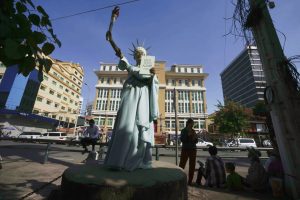A prominent Cambodian political prisoner has begun a one-week hunger strike to protest the conditions of her imprisonment in northern Cambodia.
Theary Seng, a veteran Cambodian-American lawyer and longtime critic of the Hun Sen government, was imprisoned in a mass trial of opposition supporters in June and is currently serving a six-year sentence in Preah Vihear province, close to the Thai border.
In a statement today, Jared Genser, the U.S.-based lawyer representing the 51-year-old civil society activist, said that she began the strike to demand an immediate transfer back to Prey Sar Prison in the capital Phnom Penh. She is also demanding “the same rights that other prisoners have but she has been repeatedly denied, including having weekly access to church services and the ability to regularly make phone calls.”
Theary Seng’s strike comes ahead of U.S. President Joe Biden’s visit to Cambodia on November 12-14 for next week’s Association of Southeast Asian Nations (ASEAN) meetings. During his visit, Biden will attend the U.S.-ASEAN Summit and East Asia Summit and is also expected to meet with Prime Minister Hun Sen.
“Theary’s international team calls upon the President to press Hun Sen for Theary’s freedom – and freedom for all the political prisoners of Cambodia,” Genser said in the statement.
According to the local human rights group Licadho, Theary Seng is now one of 50 “prisoners of interest” who have been locked up for their political activism in Cambodia. In June, she was one of 31 opposition activists who were sentenced to lengthy prison terms for incitement and plotting against the government of Prime Minister Hun Sen. She was charged in connection with an attempt by opposition leader Sam Rainsy to return to Cambodia in November 2019 and lead mass protests against the Cambodian People’s Party (CPP)-led government.
After the hearing, Theary Seng was taken without explanation to a prison in Preah Vihear province, some six hours by road north of Phnom Penh. According to relatives, she has been held there with 19 other women in a 4-by-5-meter room. Genser said in his statement that the purpose of the transfer was to “keep her far away from her family, counsel, and supporters.”
The June trial was just one of four mass judicial exercises covering nearly 130 defendants, most of them leaders or members of the Cambodia National Rescue Party (CNRP). The party was banned for plotting against Hun Sen’s government in 2017, and most of the party’s senior officials and supporters either ceased involvement in politics or fled into exile abroad.
Theary Seng has not gone quietly. As a dual citizen of relative means, she could easily have fled the country after her indictment in late 2020. Instead, she stayed in the country and attended each of her court hearings in elaborate outfits designed to showcase the theatrical, purely political purpose of the trials.
On one occasion she dressed in an orange prison jumpsuit, as if daring the authorities to arrest her. On the day of her arrest, she attended dressed as Lady Liberty, complete with green face paint, torch, and broken chains, and was taken away by police after the verdicts were handed down.
Like much of the Cambodian opposition, Theary Seng has long focused on trying to generate foreign pressure on Hun Sen’s government, hence the timing of the hunger strike to Biden’s visit. Given her U.S. citizenship and relative international prominence, there are already signs that Theary Seng’s case has worsened U.S. opinion of Hun Sen’s government, which has an already poor reputation in Washington given its growing proximity to China.
Her imprisonment has drawn the attention of high-ranking American officials including USAID head Samantha Power and is being used by hawkish elements in Congress to advocate for the passage of the Cambodia Democracy and Human Rights Act. If passed, this would necessitate the Biden administration to multiply the sanctions that it has already imposed on the Cambodian government.
Whether any of this does much to nudge Hun Sen in the direction of moderation is less clear. Based on the past three decades, in which the Cambodian leader has gravitated toward China to escape Western pressure over good governance and human rights issues, there is every chance that further U.S. pressure will lead in the opposite direction.

































